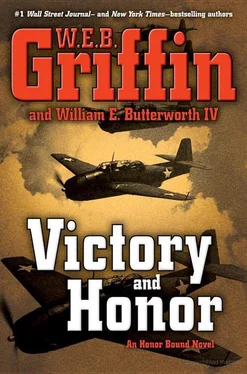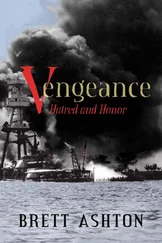All of which supported Frade’s strong suspicion that Perón had been complicit in the Nazis’ ordering the assassination of el Coronel Jorge Frade and the attempted assassination of Cletus Frade.
And when Clete—who embraced Sun Tzu’s philosophy of keeping one’s friends close and one’s enemies closer—finally ordered his Tío Juan to move out of Uncle Willy’s Avenida Libertador mansion— calling him a degenerate sonofabitch for his lust for thirteen-year-old girls—Perón had actually pulled a pistol on him. It had taken Frade considerable restraint not to let Enrico’s riot shotgun accidentally discharge double-ought buckshot in Perón’s direction.
“Some of those messages for Bishop Lombardi were from Perón,” von Wachtstein confirmed.
Allen Dulles suddenly put in: “Getting off the subject of Colonel Perón and with the caveat that there’s never a good time to say something like this, Peter and Karl, I want you to know both personally and on behalf of the OSS how very sorry we are about what Hitler did to Admiral Boltitz and General von Wachtstein.”
“Thank you,” von Wachtstein said simply.
“Thank you,” Boltitz said, then added: “But I have to tell you—fully aware that this is probably what we sailors call ‘pissing into the wind’—that I haven’t completely given up hope about my father. One of the later arrivals at Fort Hunt told me he had heard that when the word came that the bomb at Wolfsschanze failed to kill Hitler, my father, who was in Norway, in Narvik, simply disappeared.”
Frade had a sudden cold-blooded thought: He knew what was going to happen to any of the conspirators .
Jumping into those icy waters was preferable to what the SS would do to him—starting with torture and ending by getting hung from a butcher’s hook—if they got their hands on him.
“It’s possible, of course, that he took his own life,” Boltitz went on.
Jesus, he’s reading my mind!
“But I don’t think he would do that. He had Norwegian friends.”
Sorry, Karl, but I’m afraid you really are pissing into the wind.
“I’ll see if I can find out anything for you,” Dulles said.
“Thank you.”
“I’d love to say let’s go get something to drink,” Frade said. “But that’ll have to wait. Let’s go to the quincho . At least we can get some coffee.”
“You don’t need me in there,” Dorotea said. “And I have our lady guests to attend to. Clete can tell me what happened later.” She saw the look of surprise on Allen Dulles’s face and added: “He always tells me everything, Mr. Dulles. I thought you knew that.”
She then walked briskly toward the Big House.
Estancia San Pedro y San Pablo Near Pila, Buenos Aires Province Republic of Argentina 1050 12 May 1945
“When this is over,” Clete announced after everybody had filed into the quincho, “the bar will open. In the meantime, sit down, have a cup of coffee, and pay attention to our boss.”
There are all sorts of quinchos, structures originally built of poles supporting a thatched roof, designed to keep people out of the sun and rain while watching meat grill on the wood-fueled parrilla. The Big House’s quincho was somewhat more elaborate. At least three generations of Frades had used it to entertain not only their friends but the senior employees of the Estancia San Pedro y San Pablo. There was a large number of the latter.
This quincho was a substantial brick building large enough to seat fifty people at what in America would be called picnic tables. The roof was covered with red Spanish tiles, and there was a complete restaurant-size kitchen to complement the twenty-foot-long parrilla. And there was a well-stocked bar.
“Thank you, Colonel Frade, for that enthusiastic introduction,” Dulles said dryly, and sat down on one of the wooden plank tables.
“There’s good news and there’s bad news,” Dulles began. “As you’re aware, the very good news is that the Germans have surrendered unconditionally, and as soon as we’re finished here, we’ll have a drink to celebrate that.
“The bad news is that the end of any war is a dangerous time. Some argue that it can be more dangerous than during the war, because on the losing side there can be breaks in chains of command and in discipline, and lawful orders can either be lost in the chaos or be outright ignored—or both. Nor is it unusual among those on the losing side for there to be instances of every man for himself. I’ll get more into that in a moment.
“While Germany has surrendered, the fact is the war is not over for us. You won’t be sent to the Pacific. But you won’t be going home, either, because you’re needed here. And concerning that, the other bad news—there’s so much of it I hardly know where to begin—is that the OSS shortly will cease to exist.”
That announcement caused a sudden anxious energy in the quincho . Some of the Turtles suddenly sat upright, causing the wooden legs of their seating to screech across the tile floor. Others blurted a mix of “What?” and “I’ll be damned!”
Clete Frade popped to his feet and extended his right arm over his head, the palm of his hand out. “Hold it down. Let Mr. Dulles continue.”
There then came some audible sighs, but the room turned quiet again. Frade returned to his seat.
Dulles went on: “Believe me, I don’t like it any better than you men. But I’m afraid that we—the OSS—had it coming. Let me go off on that tangent. I’m sure you will all be shocked to hear that the Army, the Navy, the State Department, and the FBI have never liked the OSS. They’ve had to put up with us because the OSS enjoyed the protection of President Roosevelt. The OSS was his idea. The moment Roosevelt died the pressure on President Truman to disband us began. It increased with the German surrender. It isn’t a question of whether the OSS will be shut down, but when.
“So far as the OSS in Argentina is concerned, organizationally Team Turtle is de jure subordinate to the OSS station chief, Colonel Richmond C. Flowers, USA, who is the military attaché at our embassy in Buenos Aires.
“De facto, Team Turtle is directly subordinate to Colonel Graham and, to a lesser degree, myself. While Majors Ashton and Pelosi, who have been accredited to the embassy, are de jure subordinate to Colonel Flowers, de facto Colonel Flowers has been told that he does not have either the authority to tell them what to do or the ability to question them as to what they are doing.
“In a manner of speaking, Flowers is Marshall’s man in the OSS. His allegiance is to General Marshall, not to General Donovan. You understand, of course, that when I refer to the chief of staff of the Army, I am not referring to General George Catlett Marshall personally, but to one or more of his subordinates who know his desires and will try hard to satisfy them. That would include his deputy chief of staff or someone even lower on that chain of command. Or—almost certainly—the assistant chief of staff for intelligence, and others lower on that chain of command.
“Everyone still with me? If there are questions, please ask them. Because what I’m about to tell you concerns not only some of your fine work being completely destroyed, but also what you may well face in the very near future.”
He paused and looked around the room.
There were more than a few expressions of curiosity. But no questions.
“Okay,” Dulles said with a nod, then went on: “Shortly after Colonel Flowers was named OSS station chief for Argentina and told that he had no control over Team Turtle, he complained to General Marshall that, because of all the things Team Turtle was doing, he had nothing to do. Marshall—or, as I said before, one of his loyal underlings—complained to General Donovan. In an attempt to spread oil upon the troubled waters, Donovan threw Marshall a bone.”
Читать дальше












